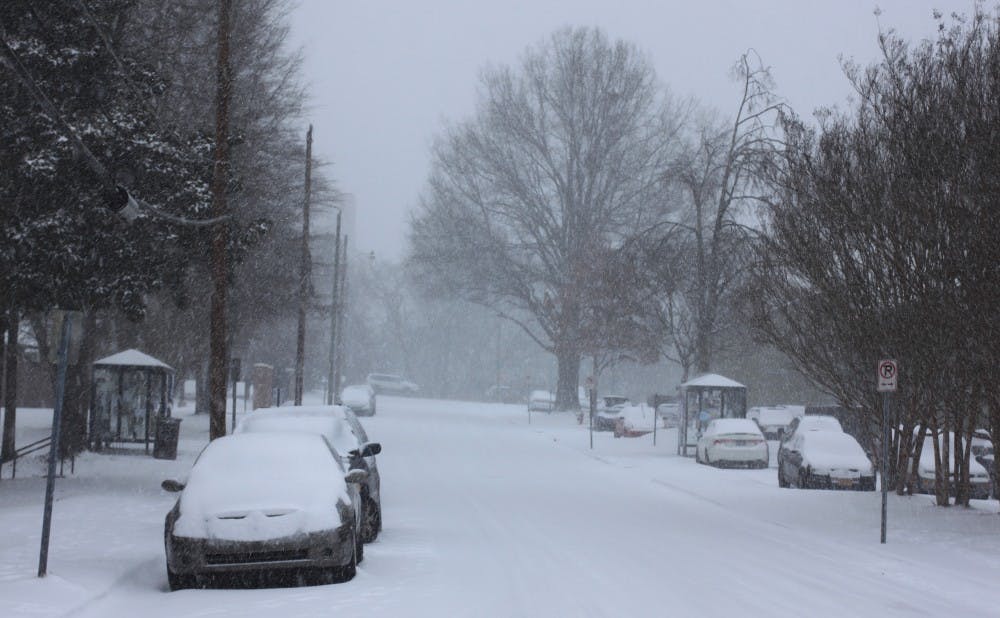There are more than 80,000 miles of road in the state of North Carolina. But Wednesday the eyes of a nation were trained on an eight-mile strip between Durham and Chapel Hill.
The year's first showdown between Duke and North Carolina at the Dean E. Smith Center was postponed as Winter Storm Pax swept through the Triangle, bringing with it more than six inches of wintry precipitation. Despite the best efforts to prepare for the storm, road conditions were subpar enough to warrant the first cancelation of a Blue Devil-Tar Heel matchup in the rivalry's 94-year history.
"It was the right decision for public safety," said John Dailey, Duke's chief of police. "There were really two separate issues. The weather reports even up to a little while ago called for significant accumulation of freezing rains. That sticks to power lines. That has the potential for widespread power outages.... And just to re-emphasize, the roads are really not in good shape."
The North Carolina Department of Transportation supported the decision to postpone the game, which aligned with the recommendations from Gov. Pat McCrory and Secretary of Transportation Tony Tata to avoid driving in the winter weather at all costs.
"We knew this was going to be a dangerous storm—a furious storm," said Mike Charbonneau, deputy secretary of communications for the North Carolina Department of Transportation. "While our crews are ready to handle what's coming, it's going to take some time. So we're going to encourage people to stay off the roads unless it's absolutely necessary."
In a brief statement following the game's postponement to Feb. 20, North Carolina Athletic Director Bubba Cunningham cited the inability of Duke's bus to reach its campus and pick the Blue Devils up as the reason the teams did not play. ACC rules dictate that a game can only be canceled if either of the teams or two of the contest's three referees are unable to travel to the stadium. The ACC's referees were on site at the Smith Center at the time the game was canceled.
A snowy blanket turned North Carolina's roads into a combination of an ice rink and a parking lot. In a team release at the time of the game's cancellation, Duke athletics estimated that the trip from Durham to Chapel Hill—which usually takes 15 minutes—would have taken between two and four hours.
On North Carolina Highway 54, 2.5 miles away from the Smith Center, drivers began to abandon their cars. Members of the media made the trek to Chapel Hill more than six hours prior to game time before being instructed to turn around and head home.
Charbonneau added that although the snow was expected to dump a heavy layer of snow and ice on the Triangle, an adjustment in Pax's patterns resulted in more difficult gameday travel for fans.
"This has been a rapidly changing storm," he said. "If you look at what they were predicting a couple days ago up and through this morning and afternoon, the models have continued to shift and change."
The pace of the storm also made it difficult for crews to treat the roads. Snow began falling rapidly shortly after 1 p.m. Wednesday and continued at a consistent rate through the early evening.
"When we get heavy snow, we're able to go out and pre-treat roads in advance," Charbonneau said. "In this case, with the amount of snow coming down so quickly in the Triangle followed by the ice that comes on top of it, there's only so much our plows can do."
With many fans from around the state and around the country unable to make it to Chapel Hill for Wednesday's game, ticket prices plummeted in secondary buying markets, which led some Duke students to brave the storm and purchase seats.
To fill the remainder of the arena, North Carolina was prepared to allow additional students to attend the game. The last time North Carolina allowed this was in 2000 for a game against Maryland after the Triangle had been hit with more than 20 inches of snow.
At 6,000 strong, the Tar Heels already have one of the conference's largest student sections. With additional students in the stands to fill the rest of the Smith Center's 21,750 seats, a usually-hostile road crowd in Chapel Hill would have been exceedingly raucous for the rivalry game.
"It would be a disservice to have a game as big as the Duke-Carolina game when it would have been unsafe for the fans, unsafe for the teams, unsafe for the employees who are needed to support the game," Dailey said. "So I'm sure it was a difficult decision for [the ACC], but for public safety it was the right thing to do."
Get The Chronicle straight to your inbox
Signup for our weekly newsletter. Cancel at any time.

